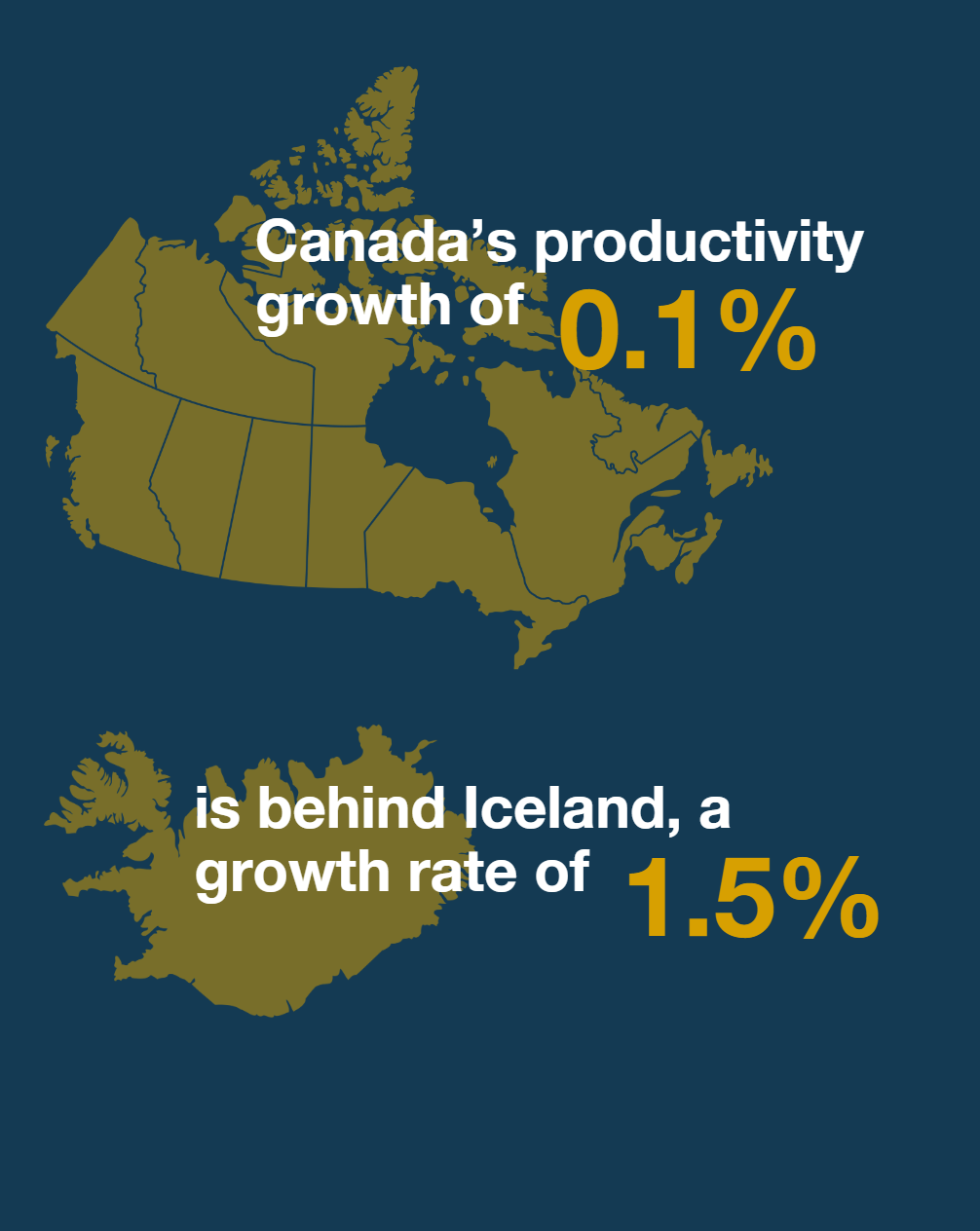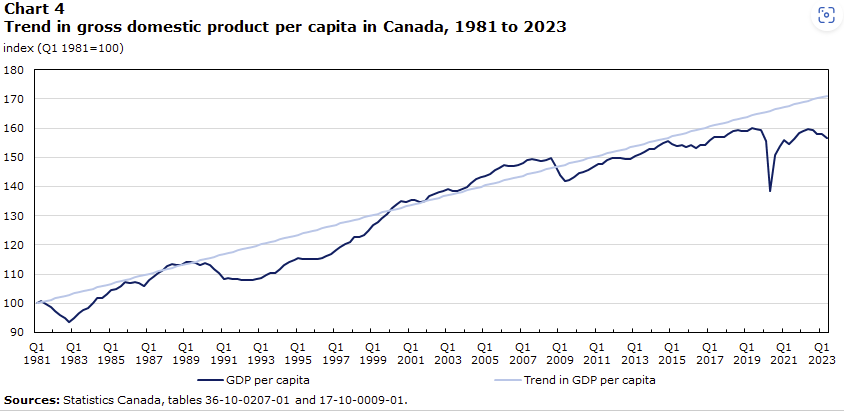Is Canada in a Recession? Productivity for SMEs
A recession is marked by a number of consecutive declining indices, such as GDP, employment rates, income levels, production, and confidence. According to these factors, a homegrown Canadian recession is unlikely. However, the Bank of Canada has recently issued a warning about a productivity problem that needs immediate attention.
What is Productivity?
Productivity is the efficiency with which a country can turn labour, resources/materials, energy, and capital into the goods and services we consume or export to other countries. Higher productivity means more output is produced with the same or less amount of input. Several measurements can help capture an idea of an economy’s productivity, the main one being gross domestic product (GDP) per hour worked.
According to the International Labour Organization, the GDP per hour worked in Canada is $57 USD, tied for 20th with Taiwan and Israel globally.
Canada’s productivity growth of .01% in 2024 is behind Iceland a growth rate of 1.5% and $58 USD of GDP per hour worked. This sluggish productivity could be an indicator of a potential Canada recession.
For perspective, aside from tax havens such as Ireland and Luxemburg, the top of the list includes Norway at $93 USD per hour worked, and the USA sits at 10th with $70 USD per hour worked.
Side note: GDP alone is not a sufficient measurement for productivity as it doesn’t consider population size. For example, BC’s GDP is approximately $300 million with a population of 5 million; whereas the GDP of Nova Scotia is about $40 million with a population of 1 million.
Why is Productivity Important?
Paul Krugman, an American economist and distinguished professor quotes, “Productivity isn’t everything, but, in the long run, it is almost everything.”
Lower productivity (less efficiency) leads to decreasing revenues, which leads to lower incomes and increased unemployment rates. This then then leads to less tax revenue, more debt, inflationary pressure, and finally dissolving social services and a recession.
As Krugman observes, productivity sets off a chain reaction directly affecting the living standards of an economy. While Canada is showing some stability in productivity or GDP per capita, the increase in productivity is almost zero and not keeping up with inflation, which is not a good sign.
We have already seen some side effects of declining productivity in Canada such as inflation, decreased investment, and less efficient public services. This can be seen in increased hospital and passport wait times and slow red tape regulation processing. There is likely to be a tail-end to this problem; even if it was corrected today, side effects would continue into the years to come.
How did we get here?
Canada Productivity and Job Market
There could be several factors that contribute to a looming Canada recession and lack of productivity, such as unprecedented population growth and our job market.
In the job market, the recent rise in public-sector employment and the negligible rise in private-sector employment could be problematic. Employment is good, but the public sector generally doesn’t have to be productive. It receives income through taxes rather than consumer spending, so if a government service isn’t providing value, it can still continue to operate without contributing effectively to the economy. Ideally, this would be rectified with stringent audits.
Canada also has approximately 30% of its workforce in unions, compared to only 10% in the United States. Unions hold more negotiation power and can demand higher salaries without providing an equivalent increase in productivity. So, while salaries go up, the GDP per hour worked stays the same, therefore decreasing an organization’s productivity. Unions are of course necessary to maintain fair working conditions, but they could be viewed as having abused their power, as can companies who don’t face enough competition in the job market.
The private sector, on the other hand, relies on consumer spending for revenue. If a private company isn’t providing value, it will not survive. Therefore, the private sector must create value, positively contributing to GDP and productivity.
On top of that, private sector organizations face significant competition (in a balanced economy), further driving productivity. Some economists claim that Canadian regulators have done a poor job of maintaining competition and many markets are dominated by a few key players. Without competition, companies are less inclined to create value and be productive.
Evidently, economics is a balancing act, and our productivity suggests we’re beginning to tilt…
What SMEs do to Improve Productivity
Being a small to medium-sized enterprise leader is difficult at the best of times. With all these outlying pressures, it becomes even more difficult. While we recognize that extra expenses aren’t necessarily an option, given the current economic environment, certain investments can help exponentially in the long run.
Side note: Our members recognize strong ROI in their TEC memberships…food for thought if you’re not already a TEC Member.
One option is to lean in on new advancements in AI. This may require an additional hire, someone with experience using generative AI and creating prompts for desired outcomes. This tool has proven to be particularly effective in marketing and communication roles. Investing in other automated technologies such as robotic processes can replace repetitive tasks and reduce salary expenses over the long term.
By investing in employee training and development, they’ll become empowered to increase their skills and efficiency. This leads to overall organizational success and employee engagement and retention. Higher engagement and retention encourage a positive culture, creating a feedback loop of increasing productivity and work satisfaction.
Items such as bonuses, stock-based compensation, and commissions are viable options for incentive programs. Some companies have taken this notion a step further and made employees part owners of the company through employee-owned-trusts (EOTs). EOTs directly tie the success of the organization to the employees, where they can share in the benefits of productivity and feel encouraged to bring their best. Other companies found that Adopting a hybrid work schedule has proven to be more productive for some organizations.
The Bank of Canada has warned that if Canada’s productivity problem isn’t corrected soon, we could see lasting negative effects for years to come and a possible Canada recession. SMEs and the private sector are largely responsible for keeping our economy on track, which is why joining forces and supporting one another during these difficult times is so important.
Through peer groups, such as those provided by TEC Canada, you can find the right advice and support and contribute your experience and knowledge to our collective success as well.
If you’d like to make your voice heard, the CFIB is a lobby group that speaks on behalf of business owners and has many ways to get involved. Follow this link to find current issues they are advocating for and how certain government policies are hurting our productivity.






